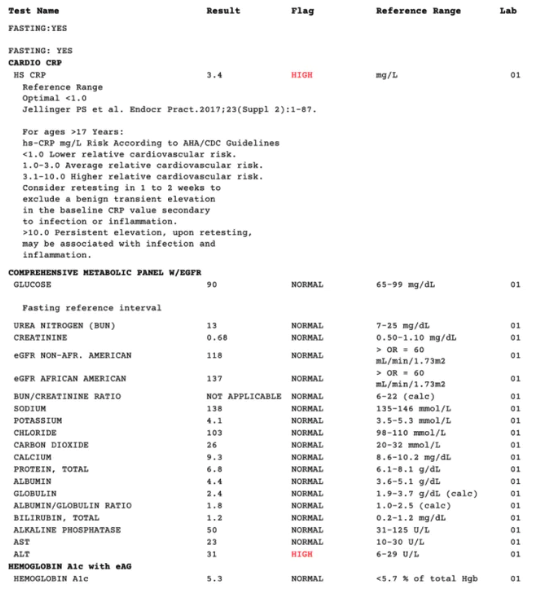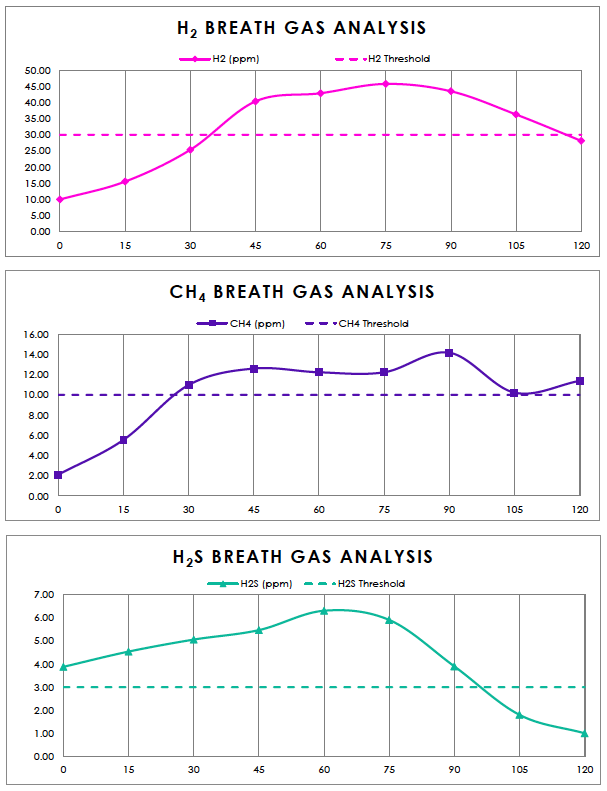Our company partners with over 30 labs and offers upwards of 6,000 individual lab tests, test panels, and test kits — all done in the convenience of your home or at a lab close to your home. Your results are delivered in a private online portal together with a comprehensive analysis and targeted superfoods and supplements handpicked to address your unique nutritional needs at this time.
MRT® Inflammatory Food Panel
What do food cravings, insulin resistance, water retention, irritable bowel syndrome (IBS), chronic pain, fatigue, brain fog, and many autoimmune and inflammatory conditions have in common?
These symptoms are often associated with chronic inflammatory signaling in the body. Inflammatory mediators — including cytokines, leukotrienes, prostaglandins, and biogenic amines — are chemical messengers released by immune cells that can influence metabolism, digestion, and neurological function. Certain foods and food-related chemicals can trigger this inflammatory activity.
The Mediator Release Test (MRT®) is the gold standard in food sensitivities testing because it tests for both immune-mediated (IgG, IgM) and non-immune-mediated inflammatory triggers, such as histamine and other biogenic amine reactions, salicylates, lectins, glutamates (MSG) and various natural and artificial food chemicals such as solanine (nightshade vegetables), caffeine, and sulfites. It is the most accurate and comprehensive blood test available for food and food-chemical reactions.
MRT® is the first test we recommend for all of our private clients.
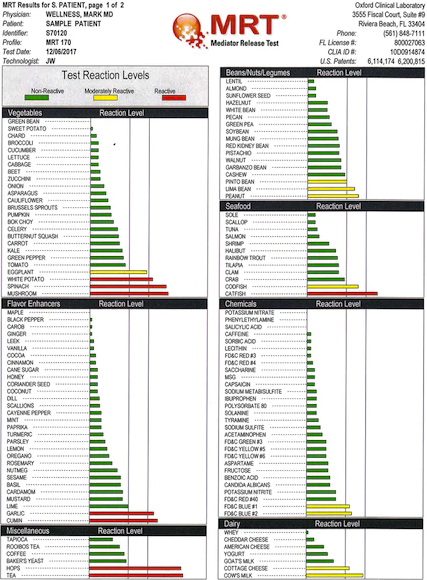
Digestive Stool Test
The GI-Map® provides a detailed and highly accurate picture of your gut microbiome. It gives us valuable insight into the root cause of indigestion, GERD, IBS, IBD, diarrhea, constipation, autoimmunity, nutrient malabsorption, food cravings, periodontal disease, and more.
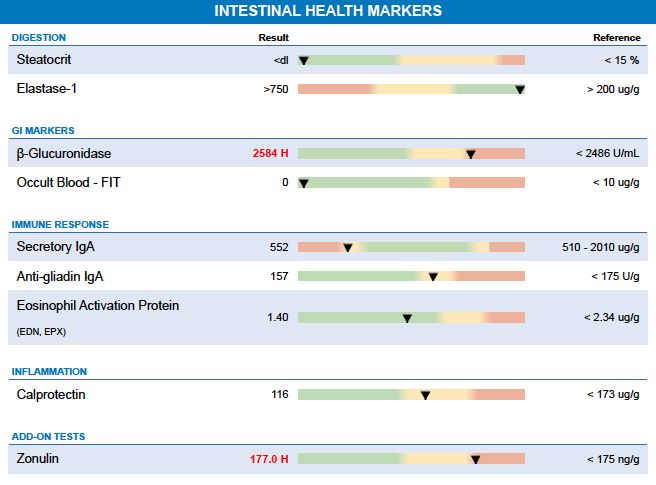
Complete Nutritional Assessment
For adults and children aged 3 and over, this non-invasive urine test with cheek swab provides a comprehensive nutritional evaluation of antioxidant and vitamin levels, toxic exposures, digestive function, the presence of intestinal bacteria and yeast, mitochondrial function, MTHFR and COMT genetic SNPs, neurotransmitters, and oxalates.
The test provides valuable insight into the potential root cause of child or adult anxiety, learning challenges/behavior problems, chronic fatigue, depression, neurocognitive decline, maldigestion/malabsorptive diseases (celiac, IBD), cardiovascular disease, diabetes, insulin resistance, or any state of increased nutritional demand such as prolonged stress, physical injury, pregnancy, and lactation.
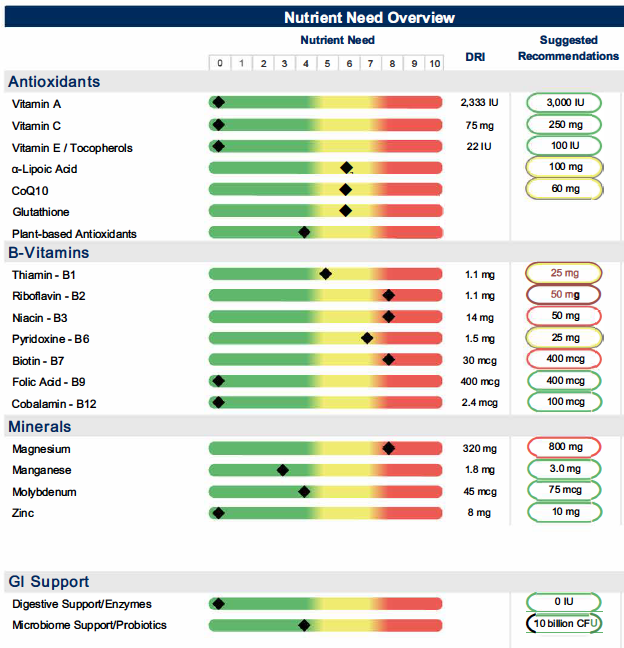
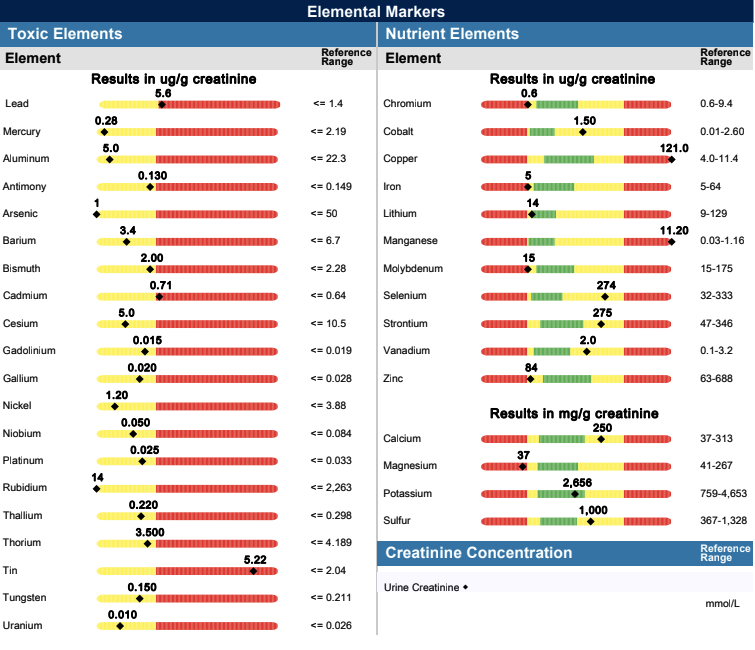
Blood Spot Insulin Resistance Profile
This profile, using only a few drops of blood collected after an overnight fast, allows for the early detection of major indicators associated with insulin resistance and “Syndrome X” or Metabolic Syndrome. As a screening profile, it can facilitate appropriate treatment to reduce diabetes and cardiovascular disease risks.
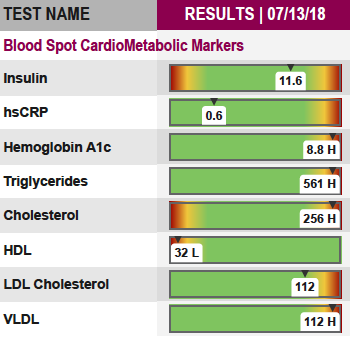
Oxidized LDL (oxLDL)
If you’ve been diagnosed with hypercholesterolemia (elevated LDL) you were probably told that you are at increased risk for atherosclerosis. You may have even been prescribed a statin drug. However, you were probably not told that LDL only becomes atherogenic when converted to oxidized LDL (oxLDL).
Small LDL particles are likely to become oxLDL — and this is especially important for perimenopausal and menopausal women, when a deficiency in estrogen will stimulate LDL production. This is the reason cardiovascular disease is the primary cause of death in postmenopausal women. Women who have had normal cholesterol readings all their lives will often see this change as they approach menopause.
Cholesterol plays many crucial roles in the body — from hormone production to cognitive function to immune activity and more. HDL is beneficial and large LDL particles are harmless. But small, dense ox LDL particles can easily penetrate the arteries, causing chronic inflammation and creating hardened plaque.
Oxidized LDL is associated with diabetes, weight-loss resistance, and hypothyroidism.
We offer this fasting blood test — done at a local lab close to your home — in order to provide better insight into your specific risk for atherosclerosis. The blood draw is less invasive than a coronary artery calcium scan that uses computerized tomography (CT) technology to reveal plaque buildup — and it can be an invaluable tool in the prevention and reversal of arterial plaque formation.
If elevated oxLDL is determined, we can help you take a proactive role by utilizing evidence-based medical nutrition therapies, botanicals, and supplements that have been shown to normalize it.
Blood-Spot Celiac & Gluten Sensitivity Profile
This at-home profile uses only a few drops of blood to detect celiac disease (CD) and non-celiac gluten sensitivity (NCGS), which are both often undiagnosed. CD is caused in genetically predisposed individuals by abnormal intestinal permeability and abnormal immune response to gluten, a protein complex found in wheat, barley, spelt, and rye. The inflammatory autoimmune response damages the lining of the small bowel. NCGS can cause similar symptoms but without the same level of tissue damage.
Common symptoms include diarrhea, bloating, flatulence, abdominal pain, fatigue, iron deficiency with or without anemia, rashes and skin problems, peripheral neuropathy or ataxia, autoimmune arthritis, neurological conditions, tics, failure to thrive (infants), bone disease or loss of bone density, hormone and fertility problems, abnormal liver function tests. Other clinical disorders including autoimmune thyroiditis, type I diabetes mellitus, and IgA deficiency are also associated with these conditions.
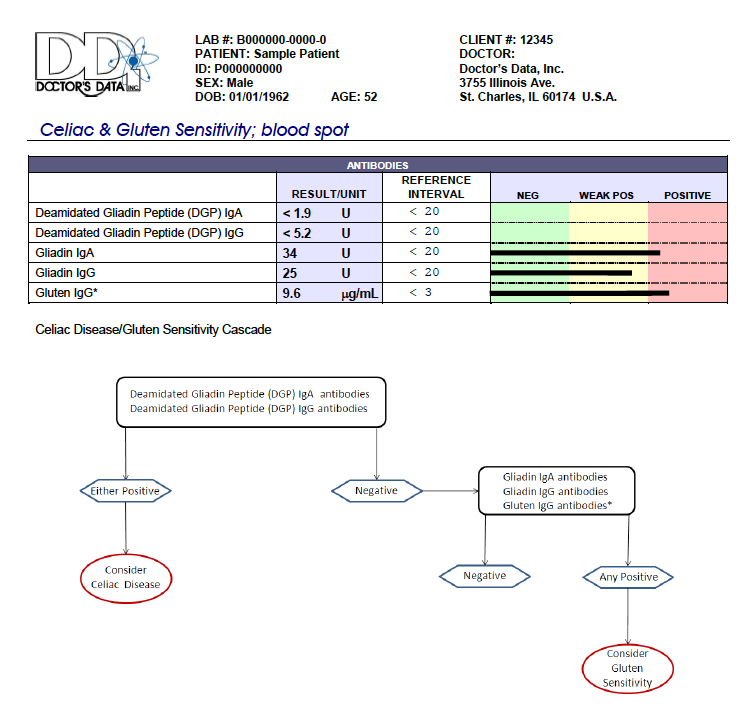
Comprehensive Female Hormone Profile
The DUTCH Test® is the gold standard in hormone testing. It provides a detailed understanding of reproductive and stress hormones together with their metabolites, as well as organic acids to detect nutritional deficiencies, oxidative stress, neurotransmitter deficiencies, and the efficiency of hormonal detoxification pathways.
We can use this information to help correct hormone-related symptoms including binge eating disorder, chronic fatigue, weight-loss resistance, PCOS, mast cell dysfunction, and a number of allergic and chronic inflammatory conditions that are known to be triggered by hormonal imbalance.
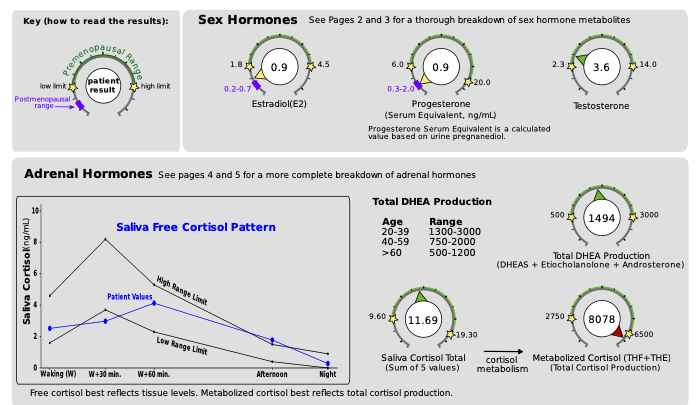
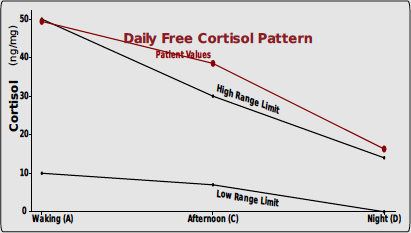
Blood-Spot Vitamin D Panel
This at-home test uses only a few drops of blood to ensure optimal levels of vitamin D for your immune, hormone, thyroid, cardiovascular, and metabolic health.
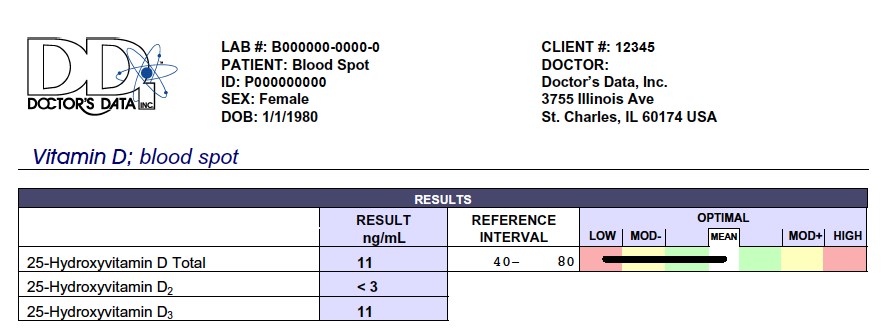
Blood-Spot Allergy Panel
Over 32 million Americans have food allergies — nearly 11% of adults and 8% of children. Those with food allergies are more than twice as likely to have asthma and more than three times as likely to have a respiratory allergy or eczema.
Typical symptoms of immune-mediated allergies and sensitivities include the obvious anaphylaxis — but also atopic dermatitis, GI discomfort, chronic pain, asthma/rhinitis, and autoimmune disease.
Different arms of the immune system facilitate both “allergy” reactions and “sensitivity” reactions, although there is some overlap. Food “allergies” involve IgE antibodies and are typically immediate, occurring within an hour — with the exception of alpha-gal exposure, which tends to present 3-6 hours after eating red meat.
Food “sensitivities” are delayed reactions that often elicit IgG4 (inflammatory type-4 IgG) antibodies. You may have IgE-mediated, IgG4-mediated, or mixed-reaction allergies or sensitivities.
For example, eosinophilic esophagitis (EoE) is diagnosed as a mixed IgE-IgG4-cell-mediated reaction that can be triggered by any of the following: milk, egg, beef, rye, wheat, peanut, shellfish, pea, chicken, fish, corn, soy, potatoes, oats, and tomatoes. Aside from a bare-bones elimination diet, testing is the only way to determine your individual triggers.
The oral food challenge test (OFC) is considered the gold-standard in food allergy testing. However, this test must be conducted in a hospital setting due to the risk involved.
Serum blood-spot testing is safe and provides far better accuracy than skin prick testing, which has a positive predictive accuracy rate of less than 50%.
Our blood-spot test uses a simple at-home finger stick blood collection to assess IgE antibodies to 150+ food and environmental allergens and IgG4 antibodies to 250+ food antigens. Assessing both IgE and IgG4 together provides us with a better picture of what is happening far beyond skin prick testing.
The IgE component of this test is the most extensive functional medicine allergy test available. It measures sensitization to foods, pollens, mites, insect venom, latex, and more.
Elevated IgG4 antibodies can promote systemic (whole-body) inflammation, and have been shown in peer-reviewed randomized controlled trials to be associated with unwanted symptoms such as chronic pain, atopic dermatitis, IBS, asthma/rhinitis, and autoimmune disease.
Eliminating foods that promote IgE and IgG4 antibody responses can facilitate gut repair and reduce whole-body inflammation. Further, an antibody-guided meal plan is more reliable and preferable over elimination diets based on food journaling and diet history alone.
Note: This test measures for allergies and sensitivities only. It does not test for food intolerances. To test for both food sensitivities and food intolerances, we recommend The MRT® Inflammatory Food Panel.
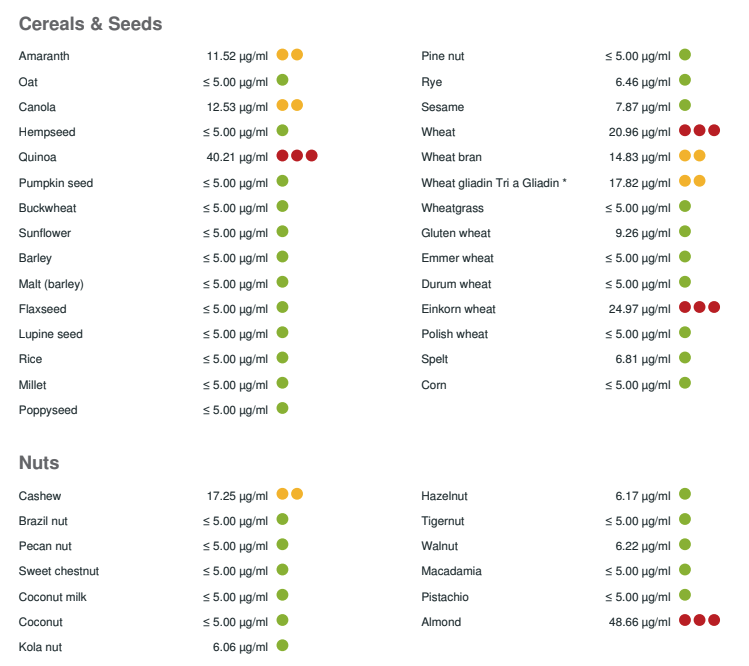
Advanced Metabolic Panel
This panel provides a robust look at thyroid hormone production and metabolism, along with a comprehensive metabolic panel (CMP), a complete blood count (CBC) with differential, a lipid profile, hemoglobin A1c, vitamin D, C-reactive protein (CRP), along with a urinalysis. The thyroid portion of this panel includes TSH, free thyroxine index, T3 uptake, total and free T4, and T3, reverse T3, thyroglobulin antibody (Tg-AB) and thyroperoxidase antibody (TPO-Ab).
The CMP includes 14 measurements that provide a glimpse into the health of the liver and kidneys, as well as glucose, calcium, protein, sodium, potassium, and chloride levels. The CBC with differential analyzes the red blood cells, white blood cells, and platelets, and screens for a broad scope of diseases and conditions including the body’s ability to defend against infection, and anemia from chronic inflammation or the malabsorption of vitamin B12, folate, or iron.
The Comprehensive Urinalysis with Microscopic Examination is an essential part of this panel. A microscopic examination can detect abnormal urine cells and formed elements. Overall, the urinalysis can detect abnormalities in the urine, which can assist in the diagnosis of renal diseases, urinary tract infections, urinary tract neoplasms, and systemic diseases. Vitamin D is assessed for its role in immune, hormone, thyroid, cardiovascular, and metabolic health.
Toxic and Essential Elements Profile
This at-home panel uses a few drops of blood and a urine sample to assess essential nutrients including iodine, selenium, zinc, copper, and magnesium, as well as toxic elements including arsenic, bromine, cadmium, and mercury.
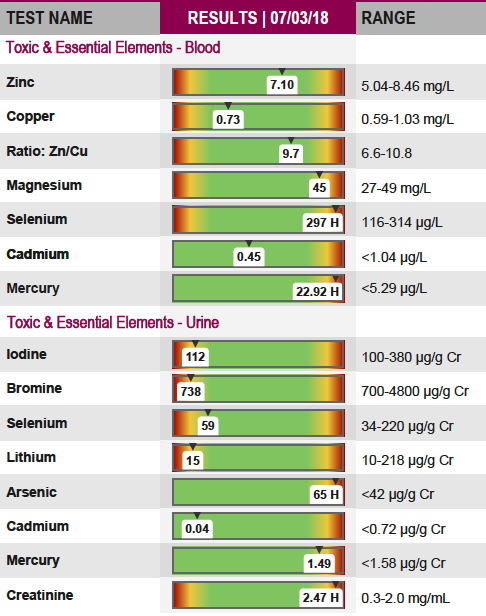
SIBO Breath Test
This is an at-home, non-invasive breath test that captures exhaled hydrogen (H2) and methane (CH4) gases following ingestion of a lactulose solution to evaluate bacterial overgrowth of the
small intestine.
Symptoms of small intestinal bacterial overgrowth (SIBO) are non-specific, encompassing abdominal pain/distention, diarrhea, cramping, and flatulence. Chronic conditions commonly associated with SIBO include IBS, IBD, MCAS, histamine intolerance, celiac, and weight-loss resistance.
Genetics Panel
This genetics panel uses a painless cheek swab to provide fast and accurate information on a wide range of SNP’s (single nucleotide polymorphisms) affecting weight management, diabetes risk, cardiac health, memory, mood disorders, methylation cycle function, and much more.
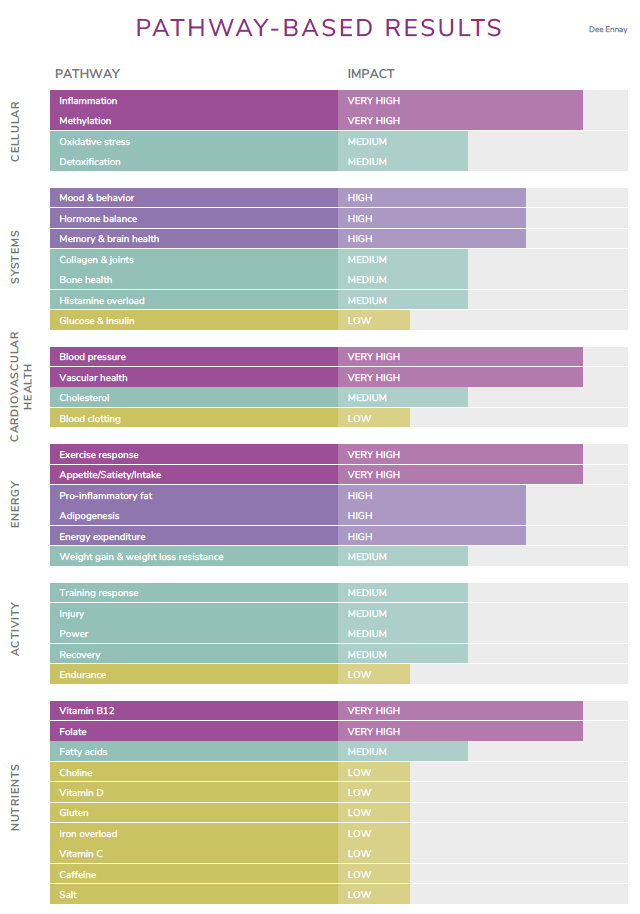
If you need help choosing a lab or would like more information about the labs we offer, please fill out an Inquiry Form and we will get back to you shortly.

